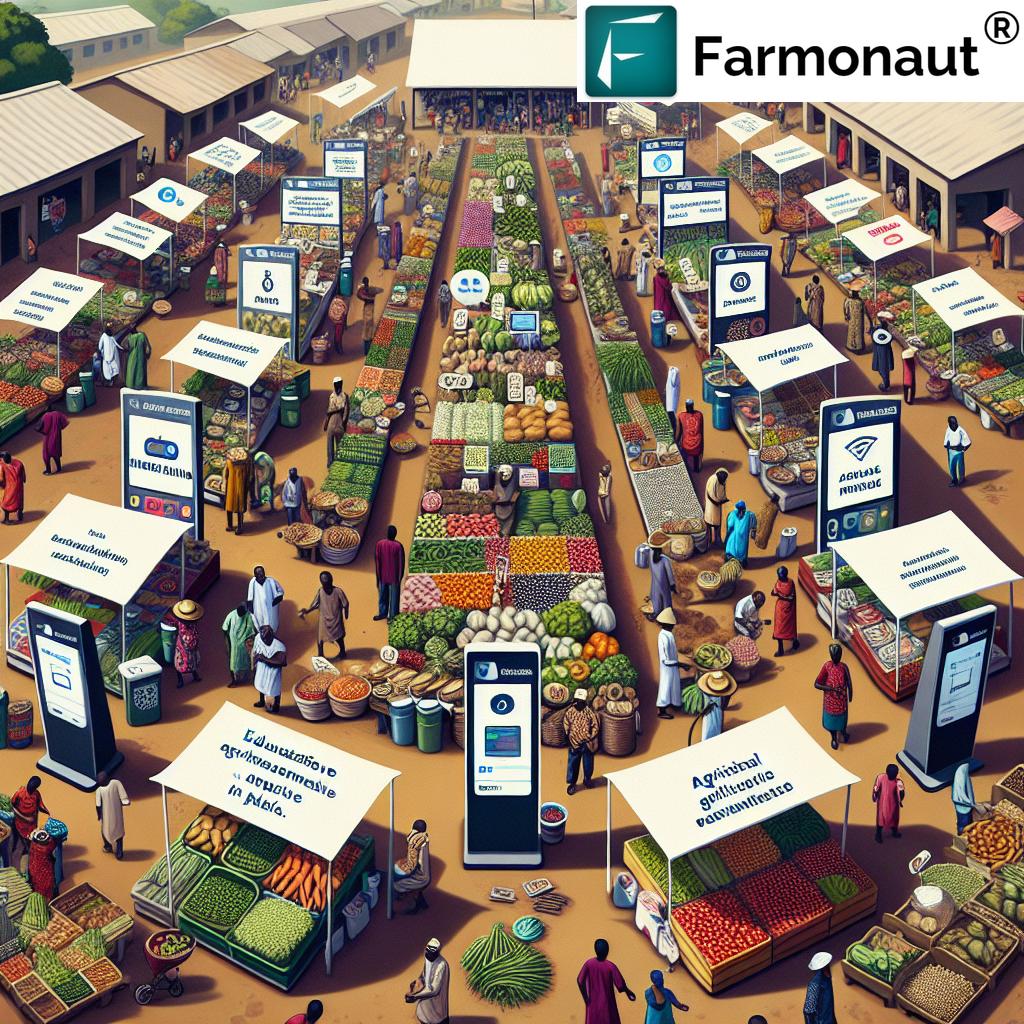Empowering Nigerian Smallholders: How Inclusive Financing Boosts Food Security and Sustainable Agriculture

“Nigeria’s smallholder farmers produce 80% of the country’s food, yet only 5% have access to formal credit.”
In the heart of West Africa, Nigeria stands as a powerhouse of agricultural potential. Yet, the nation faces significant challenges in achieving food security and sustainable agriculture. At the core of this issue lies the empowerment of smallholder farmers, who form the backbone of Nigeria’s agricultural sector. In this comprehensive exploration, we delve into how inclusive financing can revolutionize the landscape of Nigerian agriculture, boosting food security and fostering sustainable practices.
The Current State of Nigerian Agriculture
Nigeria’s agricultural sector is a complex tapestry of challenges and opportunities. Smallholder farmers, who constitute the majority of the country’s agricultural workforce, often find themselves trapped in a cycle of low productivity and limited access to resources. The Nigerian Agribusiness Development Fund (NADF) has highlighted several critical issues:
- Limited access to financial services
- Outdated farming practices
- Inadequate infrastructure
- Climate change vulnerabilities
These challenges collectively contribute to food insecurity, a pressing issue that demands immediate attention. As we navigate through these complexities, it becomes clear that a holistic approach is necessary to transform Nigeria’s agricultural landscape.
The Role of Inclusive Financing in Agricultural Development
Inclusive financing emerges as a beacon of hope in this scenario. But what exactly does it entail? At its core, inclusive financing refers to the provision of financial services to sectors of the economy that have traditionally been underserved. In the context of Nigerian agriculture, this primarily focuses on smallholder farmers.
The Executive Director of NADF emphasizes, “We believe that inclusive financing is key to supporting smallholder farmers, fostering innovation, and ultimately achieving long-term food security.” This statement underscores the critical role that financial inclusion plays in agricultural development.
Inclusive financing mechanisms can take various forms:
- Microfinance loans tailored for agricultural needs
- Agricultural insurance schemes
- Mobile banking solutions for rural areas
- Government subsidies and grants
Each of these mechanisms plays a unique role in empowering farmers and enhancing the overall agricultural value chain.
Innovative Financial Products for Smallholder Farmers
To truly empower Nigerian smallholders, financial products must be designed with their specific needs in mind. Traditional banking solutions often fail to address the unique challenges faced by farmers, such as seasonal income fluctuations and weather-dependent risks.
Innovative financial products that cater to these needs include:
- Flexible Repayment Loans: These allow farmers to align repayments with their harvest cycles.
- Weather-Index Insurance: Provides protection against climate-related risks.
- Input Financing: Enables farmers to access high-quality seeds, fertilizers, and equipment.
- Digital Savings Accounts: Facilitates easy savings and transactions through mobile platforms.
By offering these tailored financial solutions, we can significantly improve farmers’ ability to invest in their farms, adopt modern technologies, and increase their productivity.
The Impact of Technology on Agricultural Financing
In the digital age, technology plays a pivotal role in revolutionizing agricultural financing. Platforms like Farmonaut are at the forefront of this transformation, offering innovative solutions that bridge the gap between farmers and financial services.
Farmonaut’s satellite-based farm management solutions provide valuable data that can be used to assess credit risk, monitor crop health, and inform lending decisions. This technology-driven approach not only makes financing more accessible but also more secure for both lenders and borrowers.
Key technological advancements in agricultural financing include:
- Satellite-based crop monitoring for risk assessment
- Blockchain-based traceability for supply chain financing
- AI-powered credit scoring models
- Mobile banking platforms for rural areas
These technological solutions are transforming the landscape of agricultural financing in Nigeria, making it more inclusive, efficient, and responsive to farmers’ needs.
Partnerships for Progress: Government, Private Sector, and NGOs
Achieving true financial inclusion in Nigerian agriculture requires a collaborative effort. The government, private sector, and non-governmental organizations (NGOs) each have crucial roles to play in this ecosystem.
Government Initiatives:
- Policy reforms to create an enabling environment for agricultural financing
- Subsidies and guarantees to reduce lending risks
- Investment in rural infrastructure to improve market access
Private Sector Contributions:
- Development of innovative financial products
- Investment in agritech solutions
- Provision of technical assistance to farmers
NGO Support:
- Capacity building and financial literacy programs
- Advocacy for smallholder farmers’ rights
- Implementation of pilot projects to test new financing models
By fostering partnerships between these stakeholders, we can create a robust ecosystem that supports inclusive financing and drives agricultural growth in Nigeria.
Climate-Resilient Farming and Sustainable Agriculture
“Implementing climate-resilient farming practices can increase crop yields by up to 30% for Nigerian smallholders.”
As we discuss inclusive financing, it’s crucial to address the pressing issue of climate change and its impact on Nigerian agriculture. Climate-resilient farming practices are not just beneficial; they’re essential for long-term food security.
Inclusive financing can play a significant role in promoting sustainable agriculture by:
- Providing loans for climate-smart technologies
- Offering insurance products that incentivize sustainable practices
- Funding research and development in drought-resistant crops
- Supporting the transition to renewable energy in farming operations
By integrating climate considerations into financing mechanisms, we can ensure that agricultural development in Nigeria is not only productive but also sustainable in the long run.

The Role of Digital Platforms in Agricultural Financing
Digital platforms are revolutionizing the way financial services are delivered to farmers in Nigeria. These platforms offer numerous advantages:
- Increased accessibility, even in remote areas
- Reduced transaction costs
- Improved transparency and traceability
- Enhanced data collection for better decision-making
Farmonaut’s digital solutions, for instance, provide valuable insights that can inform lending decisions and help farmers optimize their operations. The platform’s API (https://sat.farmonaut.com/api) allows for seamless integration with other financial services, creating a more connected agricultural ecosystem.
Overcoming Barriers to Financial Inclusion
While the potential of inclusive financing is immense, several barriers still exist that hinder its widespread adoption in Nigeria:
- Limited financial literacy among farmers
- Lack of collateral for traditional loans
- High perceived risk of lending to smallholder farmers
- Inadequate rural infrastructure
Addressing these challenges requires a multi-faceted approach:
- Financial Education: Implementing comprehensive financial literacy programs for farmers.
- Alternative Collateral Models: Exploring options like group lending or using crop insurance as collateral.
- Risk Mitigation Strategies: Leveraging technology for better risk assessment and management.
- Infrastructure Development: Investing in rural connectivity and digital infrastructure.
By tackling these barriers head-on, we can pave the way for more inclusive and accessible financing in Nigerian agriculture.
Measuring the Impact of Inclusive Financing
To ensure the effectiveness of inclusive financing initiatives, it’s crucial to establish robust mechanisms for measuring their impact. Key performance indicators (KPIs) may include:
- Increase in agricultural productivity
- Growth in farmer incomes
- Reduction in food insecurity levels
- Adoption rates of sustainable farming practices
- Expansion of formal financial services in rural areas
Regular monitoring and evaluation of these metrics will help stakeholders refine their approaches and maximize the impact of inclusive financing on Nigeria’s agricultural sector.
The Future of Nigerian Agriculture: A Vision of Prosperity
As we look to the future, the potential for Nigerian agriculture is boundless. With the right inclusive financing mechanisms in place, we envision:
- A thriving community of empowered smallholder farmers
- Increased food security and reduced reliance on imports
- A more resilient and sustainable agricultural sector
- Nigeria emerging as a major exporter of agricultural products
This vision is not just aspirational; it’s achievable with concerted efforts from all stakeholders in the agricultural ecosystem.
Inclusive Financing Mechanisms for Nigerian Smallholder Farmers
| Financing Mechanism | Key Features | Potential Impact on Food Security | Sustainability Benefits |
|---|---|---|---|
| Microfinance Loans | Small, short-term loans with flexible repayment terms | Increased access to inputs, leading to higher yields | Enables investment in sustainable farming practices |
| Agricultural Insurance | Protection against crop failures and weather-related risks | Stabilizes farmer income, ensuring consistent food production | Encourages adoption of climate-resilient farming techniques |
| Digital Payment Platforms | Mobile-based financial services for rural areas | Facilitates quick access to funds for timely farm investments | Reduces carbon footprint associated with traditional banking |
| Government Subsidies | Financial support for inputs and equipment | Lowers production costs, potentially increasing food supply | Can be targeted to promote eco-friendly farming methods |
Conclusion: A Call to Action
The path to food security and sustainable agriculture in Nigeria is clear: inclusive financing is the key that can unlock the vast potential of smallholder farmers. By providing access to tailored financial products, leveraging technology, and fostering partnerships, we can create a more prosperous and sustainable future for Nigerian agriculture.
As stakeholders in this journey, we must:
- Advocate for policies that promote financial inclusion in agriculture
- Invest in innovative agritech solutions like those offered by Farmonaut
- Support capacity-building initiatives for farmers
- Collaborate across sectors to create a robust agricultural financing ecosystem
Together, we can empower Nigerian smallholders, boost food security, and pave the way for sustainable agricultural practices that will benefit generations to come.
FAQs
- What is inclusive financing in agriculture?
Inclusive financing in agriculture refers to the provision of accessible financial services tailored to meet the needs of smallholder farmers and other underserved groups in the agricultural sector. - How does inclusive financing contribute to food security?
By providing farmers with access to capital, inclusive financing enables them to invest in better inputs, technologies, and practices, leading to increased productivity and more stable food production. - What role does technology play in agricultural financing?
Technology, such as satellite-based monitoring systems and digital payment platforms, enhances risk assessment, reduces transaction costs, and improves the accessibility of financial services for farmers. - How can smallholder farmers access inclusive financing options?
Smallholder farmers can access inclusive financing through microfinance institutions, mobile banking platforms, agricultural cooperatives, and government-sponsored programs designed for rural farmers. - What are the main challenges in implementing inclusive financing in Nigerian agriculture?
Key challenges include limited financial literacy among farmers, inadequate rural infrastructure, high perceived risks of lending to smallholders, and the need for tailored financial products that suit agricultural cycles.















